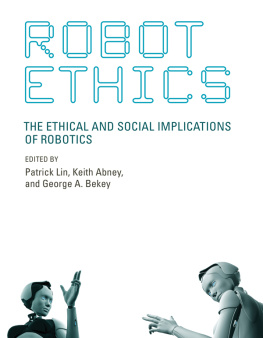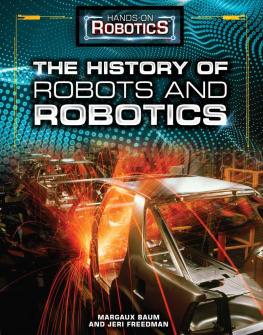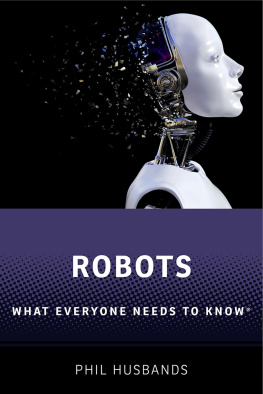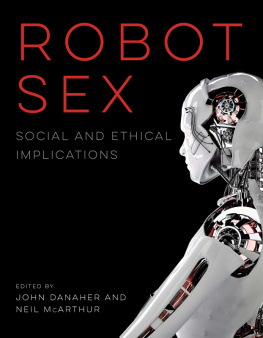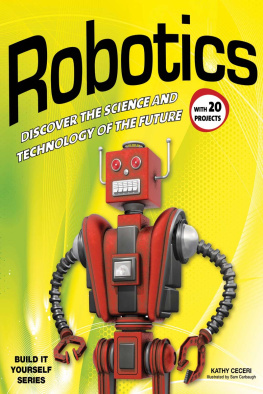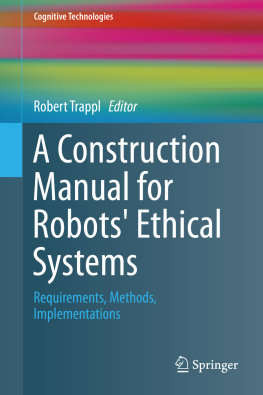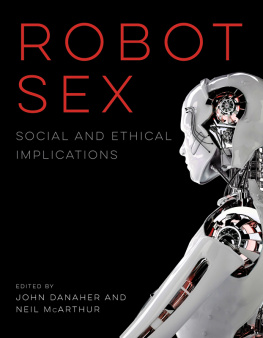Robot Ethics
Intelligent Robotics and Autonomous Agents Series
Edited by Ronald C. Arkin
Dorigo, Marco, and Marco Colombetti,
Robot Shaping: An Experiment in Behavior Engineering
Arkin, Ronald C.,
Behavior-Based Robotics
Stone, Peter,
Layered Learning in Multiagent Systems: A Winning Approach to Robotic Soccer
Wooldridge, Michael,
Reasoning about Rational Agents
Murphy, Robin R.,
An Introduction to AI Robotics
Mason, Matthew T.,
Mechanics of Robotic Manipulation
Kraus, Sarit,
Strategic Negotiation in Multiagent Environments
Nolfi, Stefano, and Dario Floreano,
Evolutionary Robotics: The Biology, Intelligence, and Technology of Self-Organizing Machines
Siegwart, Roland, and Illah R. Nourbakhsh,
Introduction to Autonomous Mobile Robots
Breazeal, Cynthia L.,
Designing Sociable Robots
Bekey, George A.,
Autonomous Robots: From Biological Inspiration to Implementation and Control
Choset, Howie, Kevin M. Lynch, Seth Hutchinson, George Kantor, Wolfram Burgard, Lydia E. Kavraki, and Sebastian Thrun,
Principles of Robot Motion: Theory, Algorithms, and Implementations
Thrun, Sebastian, Wolfram Burgard, and Dieter Fox,
Probabilistic Robotics
Mataric, Maja J.,
The Robotics Primer
Wellman, Michael P., Amy Greenwald, and Peter Stone,
Autonomous Bidding Agents: Strategies and Lessons from the Trading Agent Competition
Floreano, Dario, and Claudio Mattiussi,
Bio-Inspired Artificial Intelligence: Theories, Methods, and Technologies
Sterling, Leon S., and Kuldar Taveter,
The Art of Agent-Oriented Modeling
Stoy, Kasper, David Brandt, and David J. Christensen,
An Introduction to Self-Reconfigurable Robots
Lin, Patrick, Keith Abney, and George A. Bekey, editors,
Robot Ethics: The Ethical and Social Implications of Robotics
Robot Ethics
The Ethical and Social Implications of Robotics
edited by Patrick Lin, Keith Abney, and George A. Bekey
The MIT Press
Cambridge, Massachusetts
London, England
2012 Massachusetts Institute of Technology
All rights reserved. No part of this book may be reproduced in any form by any electronic or mechanical means (including photocopying, recording, or information storage and retrieval) without permission in writing from the publisher.
For information about special quantity discounts, please email .
Library of Congress Cataloging-in-Publication Data
Robot ethics : the ethical and social implications of robotics / edited by Patrick Lin, Keith Abney, and George A. Bekey.
p. cm.(Intelligent robotics and autonomous agents series)
Includes bibliographical references and index.
ISBN 978-0-262-01666-7 (hardcover : alk. paper)
ISBN 978-0-262-29775-2 (retail e-book)
1. RoboticsHuman factors. 2. RoboticsMoral and ethical aspects. 3. RoboticsSocial aspects. 4. RobotsDesign and construction. I. Lin, Patrick. II. Abney, Keith, 1963 III. Bekey, George A., 1928
TJ211.49.R62 2012
174.9629892dc23
2011016639
10 9 8 7 6 5 4 3 2 1
Preface
Nothing is stranger to man but his own image.
Karel Capek in Rossums Universal Robots (1921)
If not yet the world, robots are starting to dominate news headlines. They have long been working on our factory floors, building products such as automobiles, but the latest research from academic labs and industry is capturing our imagination like never before. Now, robots are able to deceive, to perform surgeries, to identify and shoot trespassers, to serve as astronauts, to babysit our kids, to shape shift, to eat biomass as their fuel (but not human bodies, the manufacturer insists), and much more.
As a case of life imitating art, science fiction had already predicted some of these applications, and robots have been both glorified and vilified in popular cultureso much so that we are immediately sensitive, perhaps hypersensitive, to the possible challenges they may create for ethics and society. The literature in robot ethics can be traced back for decades, but only in recent years, with the real possibility of creating these more imaginative and problematic robots, has there been a growing chorus of international concern about the impact of robotics on ethics and society.
For the serious reader interested in this dialog, it takes some work to pull together the various strands of discussions from books and scholarly journals to media articles and websites. Thus, we have designed this edited volume to fill that gap in the information marketplace: to be an accessible and authoritative source of expert opinions on a wide range of issues in robot ethics, all in one location. While there is some technical material in this edited collection of papers, it does not presuppose much familiarity with either robotics or ethics, and therefore it is appropriate for policymakers, industry, and the broader public as well as university students and faculty scholars.
Chapters in part I of this volume provide a broad survey of the issues in robot ethics; discuss the latest trends in robotics; and give an overview of ethical theories and issues as relevant to robotics. Then, to provide guideposts for the reader, parts II onward begin with a short introduction that summarizes the chapters in each part, organized so that there is continuity of flow from one part and its chapters to the next, as follows:
In part II, we look at issues related to the possibility of programming ethics into a robot, as an intuitive approach to controlling its behavior. Concerning what is perhaps the most prominent and morally problematic use of robots today, our discussion naturally leads to the issue of designing a responsible or discriminating robot for war, which is the focus of part III. But ethical use of military robots can also be promoted through governance or policy, which leads to the chapters on law-related topics in part IV, including legal liability and privacy concerns. Some privacy issues arise given the physical access robots may have to our homes and lives, as well as the emotional access they have from their resemblance as humans. Part V, then, starts with an investigation of risks related to such emotional bonds, followed by chapters on more intimate relationships: robots as lovers. Not quite as personal, part VI examines ethical issues related to robots as caregivers, such as for medical purposes, and as our servants. In part VII, we telescope back out to broad and more distant (but nonetheless plausible) concerns about the possibility that we should give rights or moral consideration to robots. Finally, our epilogue ends the volume with some concluding and unifying thoughts on the issues discussed.
Though the chapters follow a sensible train of discussion from part I through part VII, they do not need to be read in order. We invite you to start with whatever focus interests you the most and jump around to other chapters as desired. The crucial point here is to become engaged in this important but underdeveloped global discussion. As robots advance into our homes, workplaces, schools, hospitals, battlefields, and society at large, it would serve us well to be informed of the ethical and social issues and prepared for a more mechanized world.
Patrick Lin, PhD
George A. Bekey, PhD
Keith Abney, ABD
Acknowledgments
We thank the institutions and organizations with which the editors areor have been during the time of writingaffiliated for their support: California Polytechnic State University, San Luis Obispo, specifically the College of Liberal Arts and the Philosophy Department, as well as the College of Engineering; Centre for Applied Philosophy and Public Ethics (CAPPE, Australia); Stanford Law Schools Center for Internet and Society; U.S. Naval Academys Vice Admiral Stockdale Center for Ethical Leadership; and University of Southern Californias Viterbi School of Engineering. We also thank our many contributors, without whom this volume would not be possible, and their respective institutions.
Next page
